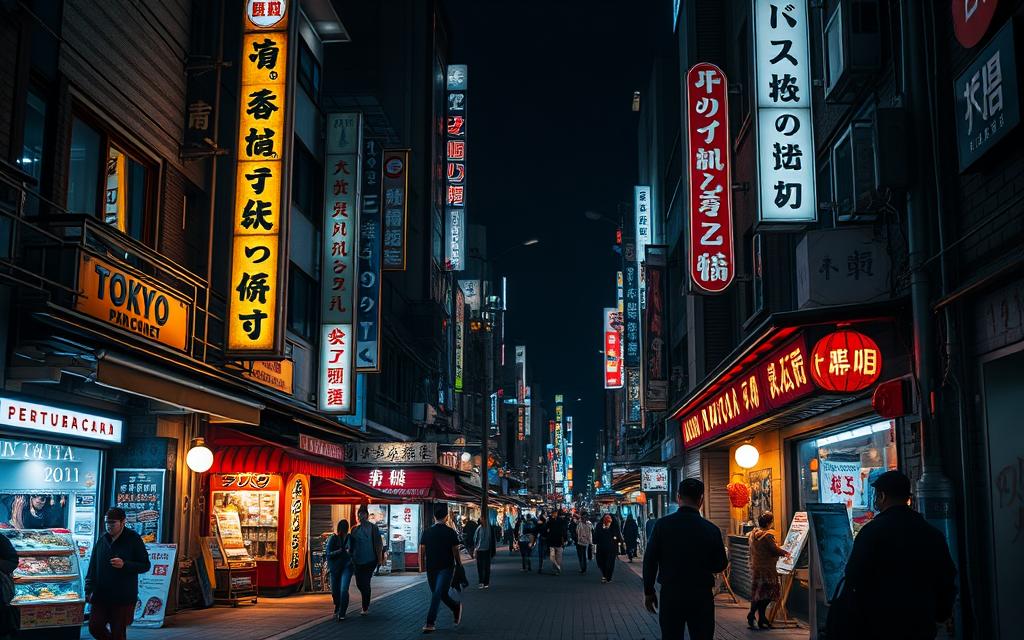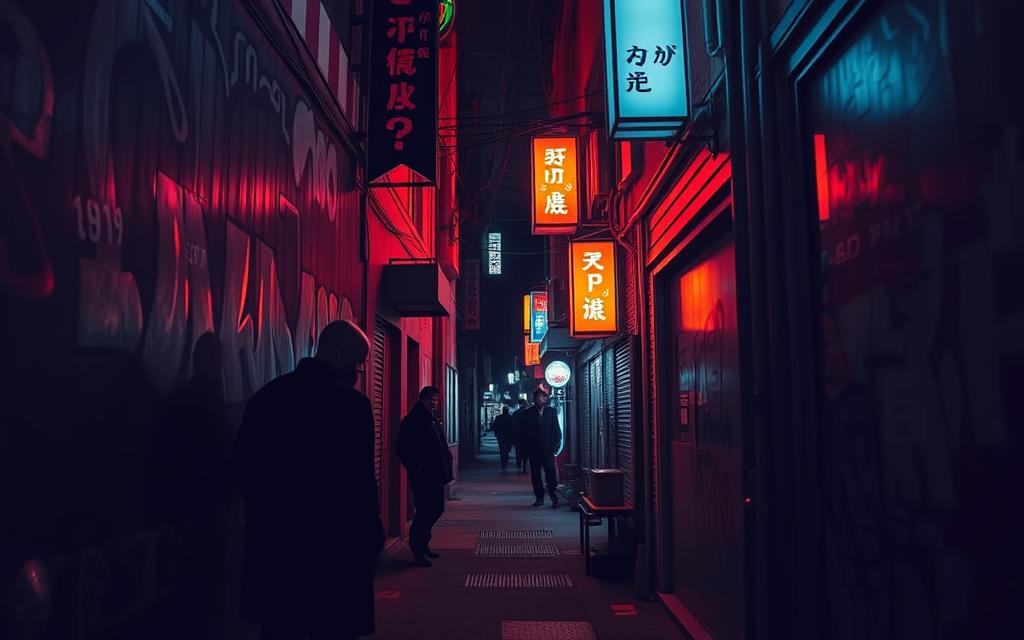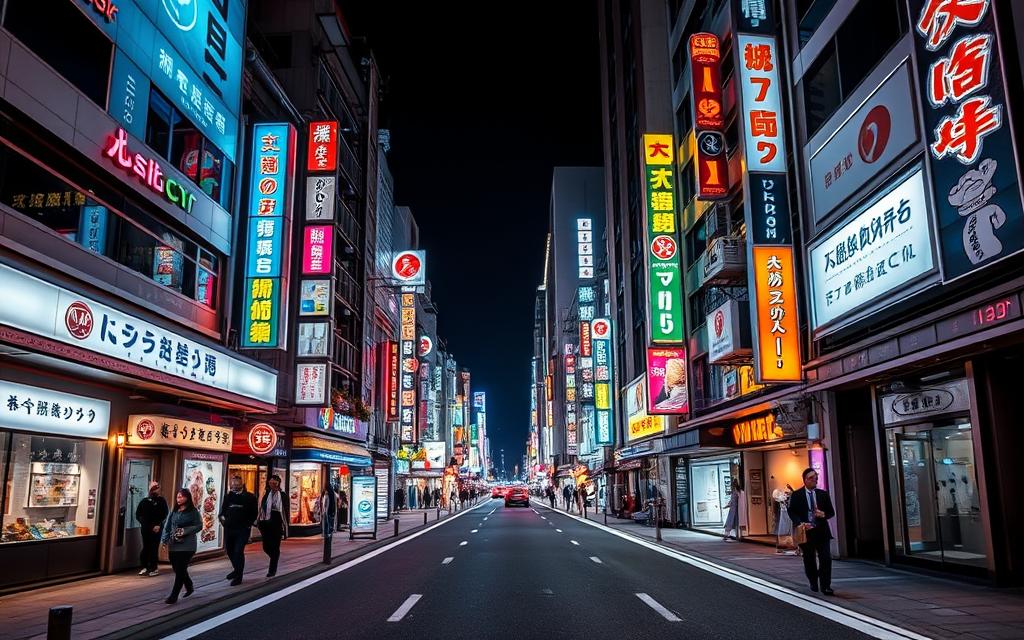Tokyo lights up with energy as the sun goes down. Many wonder: Is Tokyo safe for late-night exploring? The answer is mostly yes. It’s known for low crime and lots of police, making it very safe.
Places like Shinjuku and Shibuya are bustling but safe. Here, you can enjoy Tokyo nightlife safety without worry.
But, it’s still key to take precautions. Scams and theft can happen, especially in tourist spots. Always watch your stuff and stay alert. Drinking too much, especially alone, is not a good idea.
If you miss the last train, don’t worry. There are cool places to hang out like karaoke spots and capsule hotels. Tokyo has lots to do at night, from jazz to kabuki and views from high up.
Exploring Tokyo at night is fun and safe if you follow the rules. The city’s bright streets and friendly people make it a great place to explore. Just remember to keep yourself safe.
Overview of Nightlife in Tokyo
Tokyo is a city that never sleeps. It has some of the world’s most colorful nightlife. You can find it in districts like Shinjuku, Shibuya, Ginza, Kabukicho, and Roppongi. The city offers unique experiences that mix traditional and modern, making it unforgettable for everyone.
Unique Aspects of Tokyo’s Night Scene
Tokyo’s night scene is special because it has something for everyone. You can visit tiny bars in Golden Gai or try Japanese craft beer at places like Craft Beer Market. Shinjuku’s Robot Restaurant offers something different too. Tokyo also has a great craft beer scene, with places like Hitachino and Coedo for beer lovers.
Popular Nightlife Areas
Shibuya, Shinjuku, and Roppongi are the best places to visit at night in Tokyo. Shibuya is great for youth and international visitors. Shinjuku has izakayas, beer bars, and a lively gay district. Roppongi is for high-end clubs and fine dining, attracting ex-pats and tourists.
Shimokitazawa and Ebisu are for hipsters and trendy crowds. They offer reasonably-priced bars and indie entertainment. These places are perfect for those looking for something different.
Cultural Importance of Night Exploration
Night exploration in Tokyo is deeply cultural. You can visit temples at midnight or watch sumo practice in the evening. It gives a unique look at Japanese traditions.
Evening festivals like the Sumida River Fireworks Festival and Roppongi Art Night are cultural highlights. They feature traditional performances and decorations. Walking along the rivers or joining a guided tour offers scenic views and a safe way to see Tokyo’s beauty at night.
| Nightlife Area | Attractions | Appeal |
|---|---|---|
| Shibuya | Hidden bars, Chi bars, Nightclubs | Youth, International Visitors |
| Shinjuku | Izakayas, Robot Restaurant, Gay Districts | Mixed Crowd, Vibrant Entertainment |
| Roppongi | High-end Clubs, Fine Dining | Ex-pats, International Tourists |
| Ginza | Chic Bars, Opulent Nightclubs | Upscale Entertainment |
| Shimokitazawa | Reasonably-priced Bars, Indie Entertainment | Hipster Crowds |
| Ebisu | Trendy Dining and Drinking Spots | Hip Tokyoites in their 30s and Early 40s |
Safety Statistics in Tokyo
Tokyo is known for being very safe, with a low crime rate. It’s one of the most crowded cities in the world. With 37.4 million people and 934,500 visitors in November 2022, Tokyo shows its dedication to safety.
Crime Rates Compared to Other Cities
Tokyo’s safety stats are impressive. Japan ranks 12th in the Global Peace Index and 10th in the Bounce Women Travel Safety Index. This makes it a great place for solo female travelers. Japan’s crime rate is much lower than the U.S.’s.
There have been no muggings by a female in Tokyo for nine years. Most crimes are minor, like bike or umbrella thefts.
Noteworthy Trends in Nighttime Safety
Tokyo’s police work hard to keep the city safe at night. Places like Shibuya and Shinjuku are well-protected. There are even women-only train cars during rush hours.
While rare, drink spiking and credit card fraud can happen in entertainment areas. It’s wise to stay careful, especially in nightclubs and bars.
Sources for Safety Data
Local reports and global indexes provide reliable safety data. Tokyo’s police and indexes like the Global Peace Index rank it high in safety. These efforts help keep Tokyo safe for night activities.
| Metric | Value |
|---|---|
| Population | 37.4 million |
| Global Peace Index Rank | 12 |
| Alarming Crime Reports | Low |
| Women Travel Safety Index | 10 |
| Reported Mugging Incidents (last 9 years) | None |
| Common Crimes | Bicycle and umbrella thefts |
| Evening Law Enforcement Presence | High |
Public Transportation After Dark
Tokyo’s public transport is known for being reliable and safe. It offers many options for exploring the city’s nightlife. Knowing the operating hours and safety tips is key for safe travel in Tokyo at night.
Operating Hours of Trains and Buses
Public transport in Tokyo doesn’t run all night. Buses stop by 23:00, and trains by 01:00 at the latest. Weekdays and weekends have the same last train times, but holidays and smaller lines might vary.
Many last trains only go part of the way. So, it’s important to plan your trip carefully.
Safety of Public Transit at Night
Tokyo’s night transport is very safe. It’s ranked the safest city in the world by the Economist Intelligence Unit. The city has special cars for women during busy times to keep them safe.
Crime is rare, thanks to security and low crime rates in Japan. This makes traveling at night worry-free.
Tips for Navigating the Night Transport
Here are some tips for using Tokyo’s night transport:
- Use apps like Hyperdia and Google Maps to check train and bus schedules. This helps avoid missing the last ride.
- Get a Suica or Pasmo card for easy travel. It saves time and hassle with late-night cash.
- If you miss the last train, consider staying in a capsule hotel. They’re affordable and safer than public places. Capsule hotels cost between 3,000-5,000 yen per night.
By following these tips, you can travel safely in Tokyo at night. Enjoy a smooth journey using Tokyo’s public transit options.
General Safety Tips for Night Explorers
Exploring Tokyo at night is thrilling, with many nightlife options. Here are key tips for a safe and fun night out.
Staying Aware of Your Surroundings
Be mindful of your surroundings, especially in busy areas like Shinjuku’s Golden Gai and Roppongi’s clubs. Keep your belongings safe and avoid crowded spots. These steps are important for nighttime safety strategies in Tokyo.
Choosing Safe Route Options
Stick to well-lit, busy streets at night. Plan your route and know that trains stop running at midnight. Use apps to find safe paths and avoid risky areas. This is crucial for nighttime safety strategies in Tokyo.

Importance of Emergency Numbers
Have local emergency numbers handy for emergency preparedness in Tokyo. Know important contacts and where to find police or safety offices. In emergencies, knowing these numbers can help a lot. Always check local safety advisories to stay informed and ready for your night out.
Understanding Local Customs
Exploring Tokyo’s nightlife means knowing local customs and behaviors. It’s key to respect Tokyo’s night culture for a great experience. This section offers insights into night etiquette, traditional activities, and respectful interaction tips.
Appropriate Behavior at Night
When out at night in Tokyo, follow proper etiquette. Keep conversations quiet, especially in busy places like bars and clubs. Enjoy the quiet atmosphere many places prefer.
Bowing is a sign of respect. Be mindful of personal space in public.
Traditional Night Activities
Joining in local night activities safely makes your Tokyo trip better. Late-night tea ceremonies offer a peaceful cultural dive. Karaoke is also fun, letting you sing without disturbing others.
Tips for Respectful Interaction
To interact respectfully at night in Tokyo, follow some customs. Always remove your shoes in traditional places or some restaurants. Saying “Arigatou” (Thank you) and “Sumimasen” (Excuse me) shows you respect the culture.
Being considerate of others is part of safe night activities. Keep your phone on silent in public and line up correctly for transport or services.
Knowing these customs and etiquette makes your experience richer. It also helps you connect with Tokyo’s people and culture. Embrace these practices for an unforgettable night in Tokyo.
Areas to Avoid Late at Night
Tokyo is generally safe, but it’s important to be aware of risks at night. Knowing where to be careful can make your visit safer and more enjoyable.

Neighborhoods with Higher Crime Rates
- Kabukicho in Shinjuku – This area is famous for its nightlife. It has host and hostess bars, shops, and nightclubs. But, it’s also linked to the Yakuza. Make sure you’re in legitimate clubs to stay safe. Shinjuku ward sees 7,940 crimes each year.
- Roppongi – It’s popular with tourists for its upscale bars and restaurants. But, scams, especially by bar owners, are common here. Be careful when you visit.
- Shinjuku Golden Gai – This place has a unique vibe but has a dark past. It used to be a black market and red-light district. Even though it’s changed, it’s still wise to be cautious.
Times to Be Cautious
Some times of the night are riskier than others. Be extra careful after midnight when it’s quieter. Trust your gut and avoid dark or very crowded places.
Recognizing Potential Risks
Knowing what to watch out for can help you stay safe at night. Look for:
- Unlit Streets – Avoid poorly lit areas to reduce the risk of trouble. Stick to well-lit paths.
- Overly-Crowded Bars – Scams and small crimes can happen in crowded places. Choose well-known spots and avoid shady areas.
Knowing about Tokyo’s crime hotspots is key for visitors. Keep up with local crime reports and travel advisories for safer nights out.
| Top Tokyo Wards | Number of Crimes | Crime Rate |
|---|---|---|
| Shinjuku | 7,940 crimes | 1.10% |
| Setagaya | 7,839 crimes | not specified |
| Edogawa | 7,759 crimes | 1.03% |
Resources for Safe Exploration
Exploring Tokyo at night can be safer with the right resources. This section covers Tokyo safety resources online, emergency contact information in Tokyo, and language support services in Tokyo for tourists.
Local Apps and Websites for Safety
It’s important to stay informed about Tokyo’s safety. Local apps and websites provide updates, tips, and safe route maps. Apps like “Safety tips” from Japan Tourism Agency and “Pocket Security” are great Tokyo safety resources online.
Emergency Services and Contacts
Knowing emergency contact information in Tokyo is key for quick help. Dial 110 for police and 119 for medical or fire emergencies. The Tokyo Metropolitan Government’s hotline at 03-3202-0110 is available 24/7 for assistance.
Language Assistance for Tourists
For those who don’t speak Japanese, Tokyo can be tough to navigate. But, language support services in Tokyo are plentiful. Tourist info centers in stations like Shinjuku and Tokyo Station help. The Japan National Tourism Organization’s hotline at 050-3816-2787 offers 24/7 language help.
Using these Tokyo safety resources online, emergency contact information in Tokyo, and language support services in Tokyo makes your visit safe and fun.
What to Do in Case of an Emergency
When exploring Tokyo, knowing what to do in emergencies is key. The city’s cleanliness and polite people make it safe. But, it’s important to know how to act in case of an emergency. This is especially true in busy areas like Shinjuku’s Kabukicho and Shibuya’s Center Street.
Steps to Take if You Feel Unsafe
If you feel unsafe, go to a well-lit public area right away. Tokyo has kōban, small police boxes, everywhere. Make sure your phone is charged and know the evacuation routes.
Carry enough cash, as it’s often preferred over cards. In places like Kabukicho and Roppongi, be careful, especially at night.
Reporting a Crime or Incident
It’s important to know how to report incidents in Tokyo. Go to the nearest kōban or police station if you need to report a crime. Police officers are usually friendly and may speak some English.
If you’re a tourist, your embassy can also help. Keep their contact info handy. In case of a natural disaster like an earthquake, follow the local evacuation guides.
Finding Help from Locals
Tokyo’s people are known for being polite and helpful. In an emergency, clear and polite communication works well. Many younger people speak some English, and translation apps can help too.
Locals can show you safe places or help contact emergency services. For solo women, women-only train cars during rush hours are a good option. By asking for help from locals, you can stay safe while enjoying Tokyo.
Source Links
- https://japanswitch.com/ultimate-guide-to-tokyo-at-night/
- https://www.cityunscripted.com/travel-magazine/best-things-to-do-in-tokyo-japan-at-night
- https://www.japan-guide.com/e/e3060.html
- https://boutiquejapan.com/tokyo-nightlife-guide/
- https://www.yesweekly.com/how-to-experience-tokyos-nightlife-like-a-local/article_33b21a96-a2b2-11ef-8b4f-73c218520e4a.html
- https://www.gotokyo.org/en/story/guide/tokyo-at-night/index.html
- https://bounce.com/guides/tokyo/is-tokyo-safe-to-visit
- https://www.japan-guide.com/forum/quereadisplay.html?0 41762
- https://www.gov.uk/foreign-travel-advice/japan/safety-and-security
- https://matcha-jp.com/en/4588
- https://flipjapanguide.com/japan-safety-tips/
- https://qeepl.com/en/blog/is-tokyo-safe-a-tourist-s-guide-to-safety-and-security
- https://www.jay-japan.com/blogs/pulse-japan/tokyo-nightlife-an-unforgettable-guide-for-night-owls
- https://www.cityunscripted.com/travel-magazine/things-to-know-before-visiting-tokyo-japan
- https://www.thiscityknows.com/things-to-know-before-you-go-to-tokyo/
- https://www.twowanderingsoles.com/blog/tokyo-at-night
- https://gowithguide.com/blog/6-best-places-to-go-in-tokyo-at-night-1883?srsltid=AfmBOormuVuLOPTV1MWCVr5yWivWIjGhrKiceeTMNHifS7opvQcvx6et
- https://livejapan.com/en/in-tokyo/in-pref-tokyo/in-tokyo_train_station/article-a0002534/
- https://www.adventurouskate.com/solo-female-travel-japan-safe/
- https://www.lonelyplanet.com/articles/getting-around-japan
- https://www.worldtrips.com/resources/safe-family-travel
- https://www.cityunscripted.com/travel-magazine/is-tokyo-safe
- https://www.affordableworld.com/Blog/PrintArticle?Name=tokyo-what-to-do

